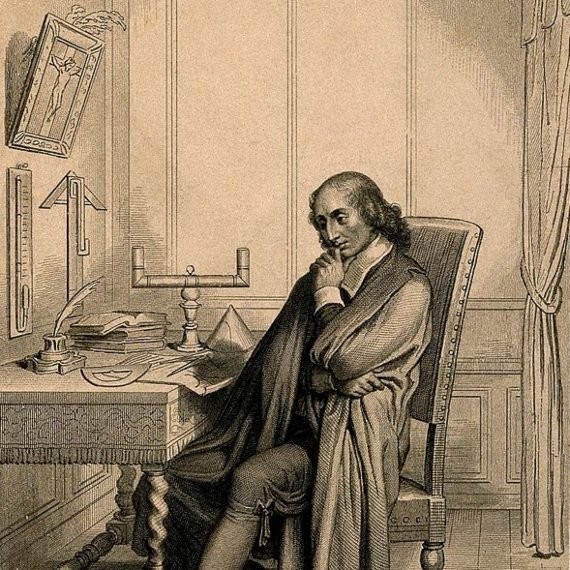Half-baked and a Little Space-y
By Michael J. Thate, PhD
My academic life began late one summer evening on the shores of Lake Johanna. That was the night I read Pascal’s Pensées. It was the summer just before my senior year at University. Most of what I’ve subsequently thought about and pursued flow from that evening. It was an encounter; a resonance was called forth from my person by a book that felt alive. Other than “Hamlet,” parts of the Bible, and a few poems from Whitman, Pascal’s collected musings are the writings I re-read the most. They also stand atop a handful of texts that still feel alive to this day. That summer night was my night of fire: it was the moment that ignited my obsessions; and everything else became secondary.
Blaise Pascal
I’m still unclear what it specifically was in the text that lit the night. Pascal was a relentless and subtle thinker. He could be bold—especially in the Provincial Letters—and yet running throughout the Pensées is an anguished questioning of it all. There is a harrowing play in his frequent shifts between the infinite expanse of the universe and the threatening void within.
Something of these tensions, I think, is what captured me. Even in my university years, I felt a fissure between the speed required to keep up with assignments and the expected style of submissions required by the administration that passed as a mastery of material. That was never me. It still isn’t. Everything I do is slow: I read slow, write slower, and think slower still. I’m always lost in questions and concepts. And Pascal slowed everything down even further.
Undeniably, then, there is something in the style of the Pensées that accounts for its continued hold over me. A good share of the Pensées, in fact, do quite little for me: e.g., his messianic proofs—or, depending on the day, the so-called wager. It was his wry honesty that kept me reading.
A few concepts stuck as well. One had to do—as alluded to above—with the frequent shifting between external spaces and internal thoughts. How does the churning within relate to cosmos without? What is the relationship between thought and space—between consciousness and the universe? Reflecting on this relationship, Pascal wrote:
It is not in space that I must seek my human dignity, but in the ordering of my thought. It will do me no good to own land. Through space the universe grasps me and swallows me up like a speck; through thought I grasp it.
There is little reward these days in staying with a question—not least in a medium such as this. This channel, that I’m entitling, “Half-Baked and a Little Space-y,” is my attempt to sit with the questions Pascal arranged along the lines of spatiality. In a real sense, of course, what we see is the result of our inner perceptual measures. We see what we’ve been disciplined to see. And yet beyond our perceptual abilities, an infinite unfurling of sights, sounds, touches, smells, and tastes exist. We perceive what we are able to perceive. And that perception works over us a lived form—a form of life. Our being in the world is thus our sense of spatial orientation.
“Half-Baked and a Little Space-y” coordinates a series of reflections on spatial orientation. It is where I’ll wrestle and play with Pascal and a host of others on how to order our thoughts in and about space. I hope you’ll check in from time to time.

